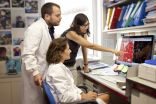(Press-News.org) Healthy people given the serotonin-enhancing antidepressant citalopram were willing to pay almost twice as much to prevent harm to themselves or others than those given placebo drugs in a moral decision-making experiment at UCL. In contrast, the dopamine-boosting Parkinson's drug levodopa made healthy people more selfish, eliminating an altruistic tendency to prefer harming themselves over others. The study was a double-blind randomised controlled trial and the results are published in Current Biology.
The research provides insight into the neural basis of clinical disorders characterized by a lack of concern for others, such as psychopathy. Serotonin and dopamine levels have both been linked to aggressive and antisocial behavior, and this study helps explain why.
"Our findings have implications for potential lines of treatment for antisocial behavior, as they help us to understand how serotonin and dopamine affect people's willingness to harm others for personal gain," says lead author Dr Molly Crockett, who conducted the study at UCL and is now at Oxford University. "We have shown that commonly-prescribed psychiatric drugs influence moral decisions in healthy people, raising important ethical questions about the use of such drugs.
"It is important to stress, however, that these drugs may have different effects in psychiatric patients compared to healthy people. More research is needed to determine whether these drugs affect moral decisions in people who take them for medical reasons."
The study, conducted by researchers from UCL and Oxford University and funded by the Wellcome Trust, compared how much pain people were willing to anonymously inflict on themselves or strangers in exchange for money. A total of 175 healthy adults took part, 89 randomised to receive citalopram or placebo and 86 randomised to receive levodopa or placebo.
Participants were randomly assigned to the roles of decider and receiver and anonymously paired up such that each decider did not know who the receiver was and vice-versa. All participants were given mildly painful electric shocks matched to their pain threshold so that the intensity was not intolerable. Deciders were explicitly told that shocks to receivers would be at the receiver's own pain threshold.
Deciders went into a room alone with a computer terminal, and each took part in 170 trials. For each trial, they had to choose between different amounts of money for different numbers of shocks, up to a maximum 20 shocks and £20 per trial. For example, they might be offered a choice of 7 shocks for £10 or 10 shocks for £15. Half of the decisions related to shocks for themselves and half to shocks for the receiver, but in all cases the deciders would get the money.
At the end of the session, one of the chosen trial results would be implemented so that the decider or receiver received the shocks and the decider received the profits. As such, their decisions had real consequences. Deciders knew that their decisions would be kept secret so that fear of judgment or retaliation would not skew the results.
A similar experiment conducted by the same team previously showed that people disliked harming others more than harming themselves, a behaviour known as 'hyper-altruism'.* This behaviour was seen again in this study, with most people more willing to harm themselves than others for profit.
On average, people given a placebo were prepared to pay approximately 35p per shock to prevent harm to themselves and 44p per shock to prevent harm to others. Those on citalopram were far more harm-averse, willing to pay an average 60p per shock to prevent harm to themselves and 73p per shock to prevent harm to others. Over the course of the experiment, this meant that people on citalopram delivered an average 30 fewer shocks to themselves and 35 fewer shocks to others than those on placebo.
People given levodopa, however, were not willing to pay any more to prevent shocks to others than to prevent shocks to themselves. On average, they were prepared to pay approximately 35p per shock to prevent harm to themselves or others. This meant that they delivered on average 10 more shocks to others during the experiment than the placebo group. They were also less hesitant to deliver shocks to others, making the decision faster than those on placebo.
INFORMATION:
BETHESDA, MD - The American Society of Human Genetics (ASHG) Workgroup on Pediatric Genetic and Genomic Testing has issued a position statement on Points to Consider: Ethical, Legal, and Psychosocial Implications of Genetic Testing in Children and Adolescents. Published today in The American Journal of Human Genetics, the statement aims to guide approaches to genetic testing for children in the research and clinical contexts. It also serves as an update to the Society's 1995 statement of the same title, which was issued jointly with the American College of Medical Genetics.
"Twenty ...
Idiopathic pulmonary fibrosis (IPF) causes a gradual loss of respiratory capacity and can be lethal within a few years. The cause is unknown, although it can be attributed to a combination of genetics and the environment. A team of researchers from the Spanish National Cancer Research Centre (CNIO) have now discovered that telomeres, the structures that protect the chromosomes, are at the origin of pulmonary fibrosis. This is the first time that telomere damage has been identified as a cause of the disease. This finding opens up new avenues for the development of therapies ...
A mutation found in most melanomas rewires cancer cells' metabolism, making them dependent on a ketogenesis enzyme, researchers at Winship Cancer Institute of Emory University have discovered.
The finding points to possible strategies for countering resistance to existing drugs that target the B-raf V600E mutation, or potential alternatives to those drugs. It may also explain why the V600E mutation in particular is so common in melanomas.
The results are scheduled for publication in Molecular Cell.
The growth-promoting V600E mutation in the gene B-raf is present in ...
The first comprehensive analysis of the woolly mammoth genome reveals extensive genetic changes that allowed mammoths to adapt to life in the arctic. Mammoth genes that differed from their counterparts in elephants played roles in skin and hair development, fat metabolism, insulin signaling and numerous other traits. Genes linked to physical traits such as skull shape, small ears and short tails were also identified. As a test of function, a mammoth gene involved in temperature sensation was resurrected in the laboratory and its protein product characterized.
The study, ...
MAYWOOD, Ill. - New devices called stent retrievers are enabling physicians to benefit selected patients who suffer strokes caused by blood clots. The devices effectively stop strokes in their tracks.
For the first time, new guidelines from the American Heart Association/American Stroke Association recommend the treatment for carefully selected patients who are undergoing acute ischemic strokes and who meet certain other conditions.
Loyola University Medical Center stroke specialist Jose Biller, MD, is a member of the expert panel that wrote the guidelines, published ...
Infrared date from NASA's Aqua satellite spotted the strongest storms within newborn Tropical Depression 10W over the Philippine Sea today, July 2. It is expected to strength to a tropical storm, at which time it will be renamed "Linfa."
A tropical cyclone is made up of hundreds of thunderstorms, and the highest storms are the coldest and most powerful. To identify those areas with the strongest storms, infrared data is used because it tells temperature. The higher the cloud top, the stronger the uplift in a storm and the colder the cloud top temperature will be.
The ...
By growing two types of stem cells in a "3-D culture" and measuring their ability to produce retinal cells, a team lead by St. Jude Children's Research Hospital researchers has found one cell type to be better at producing retinal cells.
The research not only reveals which stem cell type might be better for treating retinal degeneration, but it also demonstrates a standardized method for quantifying the effectiveness of different stem cells for such therapies.
The research was led by Michael Dyer, Ph.D., a member of the St. Jude Department of Developmental Neurobiology ...
Astronauts on the International Space Station (ISS) have a number of exercise options, including a mechanical bicycle bolted to the floor, a weightlifting machine strapped to the wall, and a strap-down treadmill. They spend a significant portion of each day working out to ward off the long-term effects of weightlessness, but many still suffer bone loss, muscle atrophy, and issues with balance and their cardiovascular systems.
To counteract such debilitating effects, research groups around the world are investigating artificial gravity -- the notion that astronauts, ...
The latest Supplement to the American Ornithologists' Union Check-list of North American Birds was published this week in The Auk: Ornithological Advances, and includes several major updates to the organization of the continent's bird species. More than just a list, the Check-list groups birds into genera, families, and orders based on their evolutionary relationships, and some of the most significant changes in this year's Supplement involve the tanagers, family Thraupidae. "Recent genetic studies have overturned much of what we thought we knew about what constitutes a ...
July 2, 2015 - While heart disease is the number one cause of death in both sexes, it poses special considerations in women--with risks often beginning in childhood and changing at different stages of life. Insights on cardiovascular disease (CVD) risk in women and girls throughout the life span are shared in a special symposium feature in the June issue of The American Journal of Medical Sciences (AJMS). The official journal of the Southern Society for Clinical Investigation (SSCI), AJMS is published by Wolters Kluwer.
Two symposium papers seek to increase understanding ...


